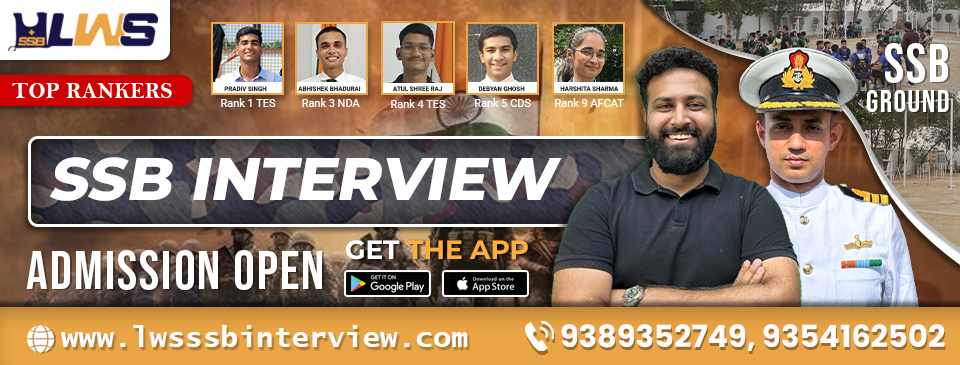The SSB Personal Interview is one of the most important and decisive phases in the selection process for the Indian Armed Forces. Whether you’re applying through NDA, CDS, AFCAT, or any other entry route, the interview helps assess your personality, mindset, and suitability for life as an officer.
Unlike traditional interviews, this one doesn’t just evaluate your academic knowledge—it’s designed to gauge your life experiences, thought process, emotional maturity, and alignment with Officer-Like Qualities (OLQs). Many aspirants turn to the best SSB interview coaching in Delhi to practice their communication, build self-awareness, and get one-on-one feedback before appearing. But with or without coaching, your goal remains the same: to present an honest and well-rounded version of yourself.
In this blog, we’ll explore real questions asked in SSB interviews, and most importantly, how to answer them confidently.
What Is the Personal Interview at SSB?
The personal interview is conducted by a senior officer, typically the President, Deputy President, or an Interviewing Officer, depending on the center. It usually lasts 30 to 60 minutes and revolves largely around your PIQ (Personal Information Questionnaire) form.
The officer uses your PIQ to build a conversation around your:
-
Education and background
-
Personality traits
-
Family life
-
Social circle and hobbies
-
Awareness of current events
-
Psychological preparedness
Each response you give is followed up with cross-questions to test your consistency and honesty.
Real SSB Interview Questions by Category (And How to Answer Them)
Let’s break down the types of questions you’re likely to face, with tips on how to frame natural and effective answers.
1. Introductory & Personal Background Questions
These help the officer ease you into the conversation and learn about your environment.
Sample Questions:
-
Tell me about yourself.
-
What does your father/mother do? How do you help at home?
-
Why do you want to join the Armed Forces?
Approach:
Start with where you’re from, then go into family background, education, and interests. Keep it structured and confident, but avoid sounding rehearsed. When answering about your ambition, connect your answer to personal experiences like NCC, discipline, or a sense of duty.
2. Academic & College-Related Questions
These judge your commitment, discipline, and ability to overcome setbacks.
Sample Questions:
-
Why did you score low in Class 12 or Semester 2?
-
Which subject do you like the most and why?
-
How do you manage studies along with other activities?
Approach:
Don’t try to cover up poor scores. Admit if you were distracted, but share how you improved or took accountability. Focus on learning attitude and how you balance academics and interests.
3. Social and Emotional Awareness Questions
Here, the officer tests your relationships and emotional maturity.
Sample Questions:
-
Describe your best friend. What do you like/dislike about them?
-
Do you have a girlfriend or boyfriend?
-
What kind of friends do you keep?
Approach:
Be honest and balanced. They’re not interested in judging your relationship status but want to see if you’re emotionally grounded. Don’t avoid the question—answer naturally and maturely.
4. Hobbies and Extracurricular Activities
They check for your real interests and your involvement outside academics.
Sample Questions:
-
What do you do in your free time?
-
Tell me more about your hobby. What have you learned from it?
-
Which book are you currently reading?
Approach:
Only mention hobbies that you genuinely follow. Be prepared to discuss them in detail, including specific experiences. If reading is your hobby, talk about a recent book and what it taught you.
5. Situational and Psychological Questions
These test how you respond under stress, your decision-making skills, and emotional intelligence.
Sample Questions:
-
What would you do if you failed this SSB?
-
Tell me about a time when you were under pressure and how you handled it.
-
What will you do if your parents don’t support your decision to join the Army?
Approach:
Answer with real-life examples. Avoid philosophical or overly ideal answers. The focus should be on calm thinking, learning from mistakes, and standing by your decisions with respect and maturity.
6. General Awareness and Current Affairs
They want to know if you’re aware of your surroundings and the nation.
Sample Questions:
-
What are the top headlines today?
-
What are the three major defense deals signed by India recently?
-
What’s your opinion on India’s foreign policy?
Approach:
Read newspapers daily, especially the editorial section. For defense-specific topics, follow reliable sources like PIB, IDSA, and official MoD updates. Be brief and factual in your answers.
7. Cross-Checking from the PIQ Form
The officer will verify everything you’ve mentioned on your form.
Sample Questions:
-
You wrote “organizing events” as your hobby—tell me about your last event.
-
You played cricket—what was your role in the team?
-
You mentioned leadership qualities—give an example where you led a team.
Approach:
Everything you write in your PIQ must be verifiable with real stories. Never exaggerate. If you participated, speak about your exact role and what you learned.
8. Tricky and Philosophical Questions
Designed to test your presence of mind and integrity.
Sample Questions:
-
What if you’re not selected this time?
-
Why should we select you?
-
If given a gun and orders, can you kill someone?
Approach:
Stay calm and think logically. For example, to the last question, you could respond: “As a soldier, I’ll follow legal orders with responsibility, keeping national interest and ethics in mind.”
Tips to Ace the SSB Personal Interview
-
Know your PIQ form inside out – This is your interview blueprint.
-
Practice speaking out loud – Use a mirror or record yourself.
-
Stay calm under pressure – The officer may intentionally challenge you.
-
Be honest – It’s better to admit you don’t know something than bluff.
-
Develop depth in your hobbies – Don’t just say “reading” or “sports”; go deeper.
Should You Take Coaching?
Coaching is optional—but if you’re unsure about communication, confidence, or structure, joining one of the best SSB interview coaching institutes in Delhi can help you with:
-
Mock interviews with veterans
-
Personalized feedback
-
Confidence-building drills
-
Help with refining your PIQ and responses
It can be especially helpful for first-timers.
Final Thoughts
The SSB personal interview isn’t about being perfect. It’s about knowing yourself, understanding your strengths and weaknesses, and presenting them with clarity, confidence, and honesty. Whether you’ve prepared with mentors, coaching, or on your own, the real test is how authentic and composed you are under pressure.
Be natural, stay positive, and treat the interview as a conversation—not an interrogation. That mindset alone will set you apart from the rest.


